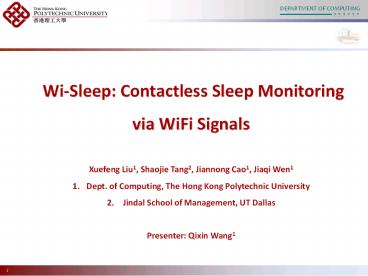Wi-Sleep:%20Contactless%20Sleep%20Monitoring%20via%20WiFi%20Signals - PowerPoint PPT Presentation
Title:
Wi-Sleep:%20Contactless%20Sleep%20Monitoring%20via%20WiFi%20Signals
Description:
Channel State Information (CSI) CSI: Using Intel Wi-Fi Wireless Link 5300 802.11n MIMO radios, ... Seamless Wireless Communication for Pervasive Internet Access Author: – PowerPoint PPT presentation
Number of Views:253
Avg rating:3.0/5.0
Title: Wi-Sleep:%20Contactless%20Sleep%20Monitoring%20via%20WiFi%20Signals
1
Wi-Sleep Contactless Sleep Monitoring via WiFi
Signals
- Xuefeng Liu1, Shaojie Tang2, Jiannong Cao1, Jiaqi
Wen1 - Dept. of Computing, The Hong Kong Polytechnic
University - Jindal School of Management, UT Dallas
- Presenter Qixin Wang1
2
Outline
- Motivation
- Related works
- Breath detection using WiFi signals
- Experiment
3
Sleep Monitoring Systems Class 1
Obtrusive to the users
4
Sleep Monitoring Systems Class 2
Privacy issue
High cost
Affected by light
5
Low cost
Touch-less
Environmentally robust
Privacy- preserved
6
Can Wireless Radios Work?
Low cost Non-intrusive Environmentally robust No
privacy concerns
7
Existing works
Using RSSI (Received Signal Strength Indicator)
for tracking respiration
- Drawbacks
- Low sensitivity ? Low accuracy
- The effect of different sleeping postures is not
investigated
O. J. Kaltiokallio and et al., Non-invasive
respiration rate monitoring using a single cots
Tx-Rx pair, in IPSN 2014.
8
Any better wireless features than RSSI ?
Packet loss rate (PLR) LQI (Link quality
indicator)
?
9
(No Transcript)
10
Channel State Information (CSI)
CSI Using Intel Wi-Fi Wireless Link 5300
802.11n MIMO radios, can provide real-time
channel state for 30 subcarrier groups
11
CSI Amplitude and Phase
12
(No Transcript)
13
Why CSI Works?
Reflection Diffusion Scattering
NLOS ? ? NLOS
LOS ? ? NLOS
14
The CSI Data Processing
Outlier removal using the median filter
15
The CSI Data Processing
Interpolation and wavelet-based noise filtering
16
The CSI Data Processing
Why choose wavelet filter instead of a general
low-pass filters?
Wavelet filter can preserve edge information,
which will be utilized when detection postures
changes.
17
The CSI Data Processing
Channel Selection using the Recurrence Plot
18
The CSI Data Processing
19
The CSI Data Processing
Final result
20
The Effect of Sleeping Positions
6 sleeping positions
21
The Effect of Sleeping Positions
When TX and RX are at the two sides of the person
Channel Selection using the Recurrence Plot
22
The Effect of Sleeping Positions
The rationale
23
The Effect of Sleeping Positions
When TX and RX are at the same side of the person
24
The Effect of Sleeping Positions
Three pairs of TX-RX
25
The Effect of Sleeping Positions
Identifying Sleeping Positions via difference in
periodicity level
26
Experimental Results
False positives and negatives
27
Experimental Results
Tracking respiration with fixed sleeping positions
TX1-RX1 (same side)
TX1-RX2 (different side)
28
Experimental Results
Identifying sleeping positions
A sleep on the back B sleep on the left
side C sleep on the right side
29
THANK YOUQA































